- Home
- Emily Kimelman
The Girl With The Gun (Sydney Rye Book 8) Page 3
The Girl With The Gun (Sydney Rye Book 8) Read online
Page 3
She grunted at my greeting.
"Private Taib doesn't have much English," Mary said. "But she's very good at her job."
"I have no doubt."
Blue tapped his nose to my hip. "This is Blue. He's my other bodyguard." I smiled at the women, trying to look friendly. They both looked at Blue, seeming surprised that I'd introduced him.
"Shall we go?" Declan asked, waving his arm toward the Humvee.
We climbed aboard—Mary, Declan, Blue and I in the back seat, the two Kurds in the front—Private Taib behind the wheel.
The mountains around us rose sharply into the starry sky. The hillsides were barren except for scrub brush that seemed to thrive on the sharp angles and dry climate.
Our headlights cut through the darkness, illuminating the blacktop. The tires droned over it, audible above the aggressive, mechanical rasp of the engine. Blue leaned against my leg, his body transferring heat through my cargo pants. I played with one of his ears, running my fingers over the velvety fur.
Mujada slowed the vehicle as our headlights hit the blackened crater of an explosion. The pavement was peeled back, large slabs of it angled toward the sky, raising up around a deep pit. She veered onto the dirt shoulder, maneuvering around the destroyed section of the road.
"An IED," Sazan said in explanation. "But don't worry," she turned in her seat flashing a smile. "There shouldn't be any more. This area has been secure for some time now."
I caught Mujada's eyes in the rearview mirror. Her eyelashes were long and thick, irises black in the low light. Charcoal edged her lids, adding to the drama of her gaze. Mujada broke eye contact as she steered the large vehicle back onto the blacktop.
As the road curved around a steep mountainside, it split and Mujada took the left fork. In the distance, a low, large structure was visible. It was a walled compound, the same dusty brown as the hillsides around it. The shadow it threw was pure black.
At the tall, solid metal entrance gate two female soldiers waited. They wore helmets and flak jackets and carried rifles. Dark figures patrolled the top of the wall. Two mounted machine guns pointed down at us.
Mujada opened her window and spoke briefly with one of the soldiers. The gate rolled open on well-oiled bearings.
Sazan pointed at a building in front of us. "That's the mess hall and meeting rooms." She pointed to three other smaller structures to her right. "The barracks." Gesturing to the left to more low buildings, Sazan explained, "More barracks and training facilities. The armory is also that way."
Mujada parked in front of the mess hall.
Blue jumped out ahead of me, and, stretching his neck, he raised his nose to the air and sniffed.
Several female soldiers stood on the inside of the entrance gate. Their expressions were hard to read in the darkness, but their eyes were trained on Blue and me. Mary climbed out of the Humvee and stood next to me, following my gaze.
"They look curious," I said.
"Wouldn't you be?"
"I'm always curious, Mary, that's what gets me into trouble."
"Or makes you great." Mary started toward the mess hall. Mujada stood next to the Humvee, waiting for me to go ahead of her.
Blue and I followed Mary, Mujada stepping in behind us. Her large, solid presence was comforting in a way I hadn't expected. Was it her even breathing? Or steady steps? Or perhaps the slight turn down of her lips, the permanent frown of concentration, that made me feel secure?
I glanced over my shoulder at the woman who was responsible for protecting me (and possibly confining me) in this place. Her body was tense and her eyes scanned the environment. Did she suspect an attack from outside? Or was it the people inside the compound that she feared?
The mess hall was filled with long, wooden tables lined with chairs; the scent of old fryer grease and coffee lingered in the air. Vinyl posters with grainy photographs hung from the rafters.
"Are you hungry?" Sazan asked as the door closed behind us. The room was mostly empty, just a few women scattered around in groups of three and four. "We have tea, coffee, water."
"Water for me and Blue."
Sazan turned to Mary, who asked for a cup of coffee; Declan wanted coffee too. Sazan gestured for us to pick a table and headed toward the kitchen to retrieve our drinks. After we sat down, Declan took a long look around the room. "It's amazing; all women."
"So amazing," Mary drawled in a mocking tone.
"You don't think so?"
"I just don't think it's as shocking as you do."
"I didn't say it was shocking." Declan's eyebrows rose. "I think it's something I've never seen before. It's unusual." He looked over at me. "I think it's incredibly powerful."
Women made up the majority of the ranks of Joyful Justice, so mess halls with few men present didn't seem unusual to me. A community of women does have a different energy though; the underlying aggression in male-dominated environments is absent, but like all camps in war zones, there was a strong sense of community.
This was a sisterhood rather than a brotherhood—the fierceness with which these soldiers fought was equal to those of their male counterparts. However, at the root of the fight was a different engine; women are physically the weaker sex; denying that is like denying that Blue has one blue eye and one brown. We are smaller, our upper bodies will never have the strength of the strongest men, and we can be violated in a way that no man can.
Men can be raped, of course, but they cannot be impregnated. No one can forcibly plant the seed of life inside a man.
However, despite those obvious physical weaknesses, women have a strength that men do not. There is a reason we are the ones who bear children. Because we can bear them, physically and emotionally.
What does all that add up to? Women are different from men: Our strength lies in our emotional intelligence and our empathy rather than in brute strength.
"Whose idea was this?" I asked Mary.
"What do you mean?"
"This place, the all-female fighting force. Was this your idea?"
Mary smiled. "I wish. This is a part of the Kurdish-Iraqi mindset. They're socialists. They believe in equality of the sexes."
"Interesting that they're so equal, yet separate. Separate but equal doesn't always work out the way it's supposed to. In fact, I don't think it ever has."
The door opened and I felt Mujada tense next to me. We were facing the entrance, our backs to the rest of the room. Blue sat behind me, covering the part of the room I could not see.
Three women walked in, laughing. Their dark hair was pulled back into high ponytails. They were slim and fit and at the very beginning of their adult lives. On their waists, they carried pistols, knives, and extra ammo.
"Everyone is armed all the time here?"
"Looks that way," Declan replied.
I turned to Mujada. "Do you speak any English?"
"A little," she answered, her accent thick, her voice a lovely, rich, gravel tone.
"Everyone wear a gun all the time?"
She shrugged and did not reply, her eyes drifting back to the entrance.
Sazan returned. She passed a steaming mug to Declan and another to Mary before sliding two bottles of water across the table to me.
I opened my small duffel and removed Blue's travel bowl. Made of waterproof canvas, it folded flat for easy storage. I filled it with water and placed it on the floor in front of Blue so he could drink and continue to watch his side of the room.
"Everyone is always armed here?" I asked Sazan.
She nodded. "It seems like the safest option."
"So do you have weapons for us?"
Sazan nodded. "Yes, of course. In the morning when the armory opens, we will get you whatever you need."
I surveyed the room, my gaze falling on the posters hanging from the rafters. Each rectangle featured three grainy photographs, the head and shoulders of women. "What's up with the posters?"
"They are martyrs," Mary answered. Her tone made me glance at her; there w
as a smile on her lips—she knew something I didn't.
"Yes," Sazan agreed. I scanned the posters, looking at each, pixilated image—most of the women had dark hair and serious expressions. "This is the newest one." Sazan was pointing at a poster to our left; it featured only one woman. She had fierce eyes, a grim expression, and scars on her neck. "The Tigress. She was a great leader of the FKP. Daesh claims to have killed her."
"Claims?" I asked.
"They posted a video beheading a woman. But many believe it was not the Tigress. That she is still alive, out there hunting Daesh."
"The FKP has ties to Iran," Mary said to me. "If you remember from your briefing."
I nodded, recalling the myriad of initialed organizations Mary had told me about. It was impossible to keep them all straight, and that wasn't just me. Mary admitted that they changed names and affiliations often. If a group calling itself FKP worked with Iran, accepting money and weapons, it didn't mean that another group, made up of the same members, but operating under different initials, wasn't working with the United States.
My gaze drifted to the furthest poster, a photograph of a blonde. I squinted, confusion hazing my vision and then the picture became clear, the whole thing suddenly obvious; it was Joy Humbolt. Thunder boomed and the hair on my arms rose as electricity sizzled in my veins.
***
The room Sazan escorted Blue and me to had honey-colored, wood-paneled walls that reminded me of movies about summer camp. A single bed with a thin mattress, hard pillow, and a slate-gray, wool blanket shared the space with a small desk and chair.
I dropped my duffle on the bed and sat down next to it. Blue sat by my side and leaned into my leg, resting his head across my knees. I ran my finger over the soft fur between his eyes. He closed his lids and sighed appreciatively.
The sounds of the camp filtered through the closed window: laughter as a group's footsteps passed, along with the rustle of clothing and the swish of sleeves.
Still dressed, I stretched out on the bed and folded my hands on my chest staring up at the blank ceiling above me. Blue lay down next to the bed, his body facing the door, while my sights fell on the single window.
Exhausted, all I wanted was to fall asleep, but the posters of martyrs was unsettling. Especially seeing my own face up there, or at least the face of my past. While I'm all for honoring the dead, it's dangerous to hold them up as some kind of example. It's too easy to turn their lives, filled with all their reality, into a useful fiction.
The mythology of Joy Humbolt was a perfect example of that fiction. The people she inspired believed that she'd taken the law into her own hands when her brother was murdered by a man too powerful for law enforcement to touch. And that was indeed my intention. But in reality, I was too late. Robert Maxim, a man with even more influence, arranged his death, not to avenge my brother, but to protect his own interests.
There was nothing noble about what happened. Nothing worth replicating.
However, Joyful Justice was spawned from that fiction, and I believed in the organization and its mission. I'd always thought of it as inspiring people striving for their own goals: the sex slave fighting for her freedom, the mother battling for the environment her children lived in, communities eradicating the drugs that plagued their lives.
Here, Joy was a war hero.
I'm not talking about the "war against injustice," war in a metaphoric sense. These women were fighting for control of land and what kind of lives could be lived upon it.
A soft knock at my door and Blue was on his feet, nose pressed to the crack underneath it.
"Who is it?" Without a weapon to grab, I felt naked.
"Mujada."
I turned the deadbolt and opened the door. "Come with me." Her words were stilted but practiced.
"Why?"
She beckoned, crooking her fingers up and pulling them toward her palm. I glanced back at my duffle. Should I bring it with me? Mujada shook her head.
I grabbed Blue's leash and clipped it to his collar before following her down the hall. We stepped back out into the night and Mujada led me quickly across the road to a darkened building.
Retrieving a key from her pocket, Mujada opened the deadbolts and pulled the door wide. I stepped into the darkened room first. The sound of my boots on cement echoed. We were in a room with high ceilings. It smelled like oil and dust.
Mujada closed the door behind us and clicked on a flashlight. The light illuminated a polished, gray floor, then panned up, hitting the metal legs of storage shelves and exposing wooden crates with Kurdish letters stenciled across them in white spray paint. Mujada moved forward, Blue and I in her wake.
She passed the first shelving unit and turned down the next aisle.
My eyes struggled to adjust in the darkness because of the bright beam of the torch. I could sense that the shelves rose to the ceiling, which felt about twelve feet tall. Blue's nails clicked against the cement in time with the clunk of our boots.
Mujada stopped, and placing the flashlight between her shoulder and ear, she used both hands to open a crate at about chest height.
The light shook from her movements, but I could see that inside the crate, cushioned in black foam, were automatic rifles. The same make and model as the ones carried by the guards at the gate.
She pulled one out and handed it to me before retrieving another for herself. It smelled brand-new. Mujada replaced the lid and continued down the aisle.
The back wall of the building was lined with more shelves. Mujada scanned with her flashlight until it lit up boxes of bullets. She grabbed two, handing them to me, and then took two more for herself.
Mujada turned back toward the door and picked up her pace as we headed to the exit.
We left the building, the machine guns on our backs, the bullets in our hands. Mujada locked the door, turned off her flashlight, and gestured that we should return to the barracks.
Back in my bedroom, the door locked behind us, Mujada's big body resonated with tension. She went to the window and looked through the small gap in the curtains.
The room felt even smaller with the three of us in it. Mujada released the clip from her rifle and began to fill it. I followed her lead.
The bullets were beautiful; gold and smooth, about the length of my middle finger, pointed at the tip with a thin shaft that led to a thicker one. The low thrum of thunder purred as I ran the pad of my thumb over the grooved rings on the circular base.
We worked in silence, and when it was done, Mujada pushed her clip home with a satisfying click before leaning against the wall and peering through the slit in the curtains.
She gestured for me to get in bed. I cocked my head. She pulled back the covers and patted her hand on the pillow.
I looked down at the weapon in my lap.
Why, surrounded by allied women in arms, did Mujada think it necessary that I not only cuddle up with a machine gun tonight but that I sleep with her standing above my head, armed and ready to defend me?
Blue was sitting on the floor watching Mujada, his tail swishing back and forth slowly.
I removed my shoes, keeping the cargo pants and shirt on, before stretching onto the bed. Mujada hit the lights. I rolled onto my side so that my back was to Mujada and Blue and the door.
I trusted them to protect me from the physical world. Could anyone save me from the deterioration of my mind?
Chapter Four
In the morning, Mujada was gone.
Blue stood and stretched, sticking his butt up in the air and waving his tail around, letting loose a big yawn that exposed his teeth all the way to his molars.
I stood and reached toward the ceiling stretching myself. Blue pushed against my hip with his nose and looked at the door, encouraging me to go for a run.
"I don't think this is the kind of place you go for a jog. I'll ask Sazan about it, though."
Blue yowled and tapped his feet, refusing to accept my explanation. "How about some breakfast first?”
/> I fed Blue and refilled his water.
Standing at the window, listening to Blue crunch on his kibble, I watched the base wake up. The sun exposed the landscape that the shadows of the night before had only hinted at. The base sat on a flat plain, the distant hillsides, rocky and steep formed a forbidding border. I’d thought the only vegetation was scrub brush, but in the morning light I could see thick forests of pine trees at higher altitudes. I’d expected a desert landscape, something devoid of life.
When Blue finished breakfast, I grabbed my toiletry bag and fresh clothing, heading down the hall. Blue waited outside as I showered quickly and put on clean, gray sweatpants, a white T-shirt, and a matching sweatshirt.
When I put on sneakers and clipped a leash to Blue's collar he got excited, vibrating with energy as we left the barracks. "We're not going running right now."
My statement did not damper his enthusiasm. As we moved through the brightening day toward the mess hall, his nose rhythmically tapped my waist.
I could hear the din of conversation from the steps of the dining room, and when I opened the door, the sound was amplified. Over a hundred women filled the space. They sat at the long tables talking and laughing, their cutlery smacking against plastic plates. A line snaked around the room to the buffet. I joined it and Blue scanned the room, his nostril's flaring.
The women were dressed in fatigues and combat boots, sidearms holstered on their hips. They were looking at us. Not all at once, but taking turns. Blue was the only dog and I was the only person out of uniform in the room.
My gaze rose to the posters of the martyrs. Would I ever be comfortable or truly understand the role which Joy Humbolt played in the world?
Sydney Rye, with her discipline and strength and bravery, was so much more real to me than that blonde, sweet-looking girl who held a place of honor in this war zone.
The energy in the room shifted and I turned to see Declan entering. He moved smoothly toward the line of women waiting for the buffet. Declan moved like a tiger lurking in the jungle, hiding with his stripes.
I waved to him and he smiled. We looked at each other, wondering about the protocol of cutting in line. It felt silly and somehow very high school. Maybe it was because most of these women were so young, their faces unlined and the pitch of their voices not yet fully matured.

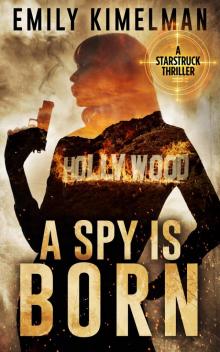 A Spy Is Born
A Spy Is Born Dr. X's Island
Dr. X's Island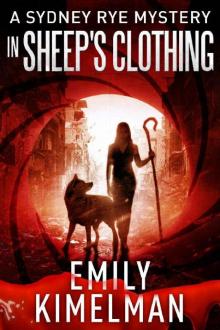 In Sheep's Clothing
In Sheep's Clothing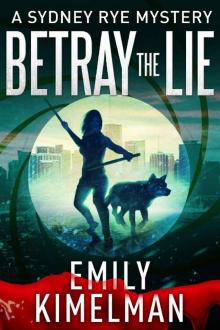 Betray the Lie
Betray the Lie_preview.jpg) Unleashed (Sydney Rye Series #1)
Unleashed (Sydney Rye Series #1)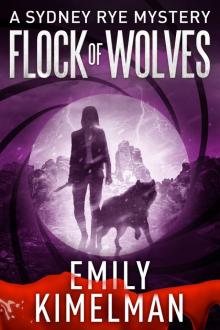 Flock of Wolves
Flock of Wolves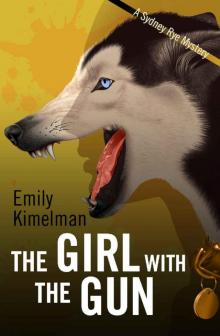 The Girl With The Gun (Sydney Rye Book 8)
The Girl With The Gun (Sydney Rye Book 8)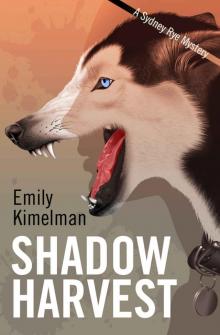 Shadow Harvest (A Sydney Rye Mystery, #7)
Shadow Harvest (A Sydney Rye Mystery, #7)